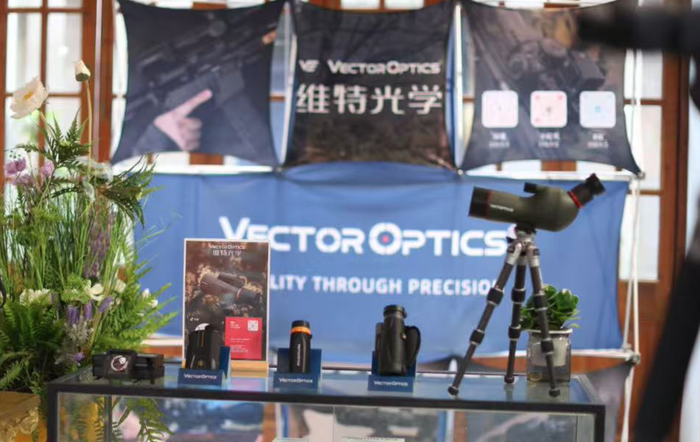With support from local authorities, Shanghai exporters are redirecting goods to the domestic market after Washington's latest tariff hike.

Photo from Jing'An Distrct
by Yang Shuhongji
Following the latest tariff hikes announced by Washington, some Shanghai-based exporters are taking immediate steps to cushion the blow. Vector Optics, a Shanghai-based manufacturer of optical aiming devices used in hunting, defense, and competitive sports, said it immediately suspended shipments to the US following the White House’s announcement last week of additional tariffs on Chinese goods.
The US is the company’s largest overseas market, accounting for about 20% of revenue, or more than 40 million yuan annually. Its products rank among the top 10 in their category in the US, and have built a steady following among North American consumers through innovation and strong visibility on social media.
Shanghai is home to about 22,000 exporters with trade records involving the US. Intermediate and industrial goods account for 85% of those exports, while consumer goods make up roughly 10%, according to official data.
Zhu Min, director of the Shanghai Municipal Commission of Commerce, acknowledged that the new US tariffs will have an impact on local exporters. He noted that local administrative bodies have been working to support affected firms.
In the case of Vector Optics, officials from the Jing’an District commerce bureau visited the company on April 11, the same day the tariff news broke. By April 14, targeted support policies had already been rolled out.
The company said it was advised to explore alternative international markets while also shifting its export-oriented products toward domestic sales—an approach it had already been considering.
“We’re now actively expanding into outdoor adventure and hunting markets outside the US, while also developing domestic applications for our products,” a Vector Optics representative said. Several of its telescope products originally designed for export are expected to be launched in local retail channels.

That transition is being supported by an integrated trade platform launched by Jing’an District to help exporters reach domestic buyers both online and offline.
According to Zhao Lantian, deputy director of the Jing’an commerce bureau, foreign-invested companies account for nearly 10% of the district’s total registered businesses and contribute close to half its tax revenue. In 2024, foreign trade volume from the district approached 100 billion yuan.
One of the major retail buyers participating in the program is hypermarket chain RT-Mart. As of April 15, the company had received applications from 77 suppliers, covering categories such as general merchandise, small appliances, food, fresh produce, and textiles. RT-Mart’s general merchandise director Qin Cong told Jiemian News that some suppliers now face inventory backlogs valued in the tens of millions of yuan due to stalled US-bound shipments.
Many of the products were originally customized for foreign markets and could appeal to local consumers for their unique features, RT-Mart said. The retailer plans to set up dedicated “foreign trade product” sections across its nationwide store network and expects that, for some firms, stockpiles could be cleared within one week to a month.
However, adjustments will be needed before launch, including certification, compliance, packaging, and product functionality tweaks—particularly for electrical goods that must meet domestic standards. RT-Mart said it would work with government departments and manufacturers on market positioning and flexible supply strategies.
More than 20 platforms including JD.com, Baidu, Meituan, Suning.com, and Douyin have also announced initiatives to help exporters pivot to domestic sales, ranging from AI tools to traffic support and dedicated product zones.
While policy support has helped mitigate some of the pressure, companies are also adjusting their strategies. Some exporters said they plan to renegotiate prices with US distributors to maintain profitability. Others are increasing R&D investment to strengthen technological barriers and offset tariff risks.
Zhu, the Shanghai commerce chief, said many of the city’s products remain globally competitive and are difficult to substitute. Talks are ongoing between Chinese suppliers and American buyers to resolve pricing and tariff issues. To further assist companies, Shanghai will host a matchmaking event this week bringing together 14 major e-commerce platforms and foreign trade firms to explore solutions for the latest round of tariff hikes.Offline supermarket chains such as Yonghui, Wumart, CR Vanguard, and Lianhua have joined in, offering “fast-track” access for qualifying exporters.
While exporters seek to adapt to tariff shocks, Shanghai is also leveraging other policy tools to stabilize demand. One focus has been boosting inbound consumption from overseas travelers.
On April 8, China’s tax authority expanded a pilot “instant tax refund” scheme for overseas shoppers to a nationwide program. In Shanghai’s Zhangyuan commercial district, French fashion house Celine launched a new global collection with on-site tax refunds for international customers.
Shanghai is among the cities piloting this program, which allows tourists to receive their refunds directly at the point of purchase rather than waiting until departure.
Jing’an District, one of the city’s most concentrated zones for international brands, is fast-tracking upgrades to cashier systems and refund services. The district aims to include 1,000 local businesses in the scheme and is planning to offer “Jing’an Gifts”—exclusive packages available to shoppers who request tax refunds within the district.